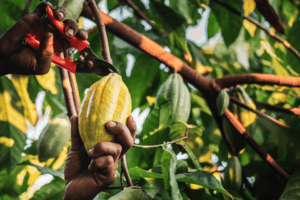Snickers maker Mars to use gene-editing in pursuit of stable chocolate supply
The candy giant is using Pairwise’s plant-breeding technology to improve cocoa production as climate challenges and disease send prices soaring.

- Candy giant Mars is using gene-editing CRISPR technology to breed a better cocoa plant as climate challenges and disease pressure global chocolate production.
- The Snickers and M&M’s maker is licensing the innovation from Pairwise, a seven-year-old company using CRISPR to change the DNA of fruits, vegetables and other plants.
- Mars will use the tool to identify genetic traits that could help crops become disease-resistant or adapt to hotter temperatures.
A global cocoa shortage has raised costs dramatically, prompting food companies to raise chocolate prices.
Hershey in late July told retailers it would hike prices by double digits, citing the “unprecedented cost of cocoa.” The chocolate giant has also tweaked its innovation approach to rely less on chocolate and more on peanut butter, wafers and other trendy ingredients.
Other chocolate makers have been feeling the heat from higher prices, including Swiss chocolatier Lindt, which also raised prices by double digits. CEO Adalbert Lechner said Lindt is seeing demand slide as commodity costs remain “close to record highs.”
Drought, aging trees and plant disease have depleted the supply in West Africa, which is responsible for 70% of the world’s cocoa crop. While chocolate makers are hopeful that supply will recover due to an improved crop and lower demand, Lindt’s CEO told investors on Aug. 1 that “plant diseases continue to affect cocoa farms in West Africa and the overall situation remains volatile.”
By investing in gene-editing research, Mars hopes to tackle farming challenges in cocoa production and ensure a steady supply of the commodity, Food Dive reports.
Pairwise’s flagship technology platform, Fulcrum, gives companies access to a suite of tools for using CRISPR gene-editing to develop new crops and bring them to market faster than traditional breeding methods. The company has used the technology to develop commodities, such as seedless blackberries and bitterless mustard greens.
“At Mars, we believe CRISPR has the potential to improve crops in ways that support and strengthen global supply chains,” Carl Jones, plant sciences director at Mars, said in a statement. “Our focus is to transparently and responsibly conduct CRISPR research in plant science that helps crops better adapt to climate challenges, disease pressures and resource constraints.”
Food giants, including Hershey, Mondelēz, Nestlé, have invested millions of dollars to improve cocoa output and support sustainable farming. Companies have also shown interest in alternatives, with Mondelēz’s venture capital arm investing in lab-grown cocoa production.
Related news
Aldi and Lidl cut prices of chocolate products
🎧 Hallgasd a cikket: Lejátszás Szünet Folytatás Leállítás Nyelv: Auto…
Read more >Related news
II. Green Gastronomy – Marketing Communication Workshop organized by the MMSZ HoReCa and Green Section
🎧 Hallgasd a cikket: Lejátszás Szünet Folytatás Leállítás Nyelv: Auto…
Read more >Retail sales of organic products in Hungary increased by 13.9% – our country is the second fastest growing market in the European Union
🎧 Hallgasd a cikket: Lejátszás Szünet Folytatás Leállítás Nyelv: Auto…
Read more >Nearly 140 domestic suppliers, 60% growth – SPAR Regions Treasures program accelerates with AI solutions
🎧 Hallgasd a cikket: Lejátszás Szünet Folytatás Leállítás Nyelv: Auto…
Read more >









